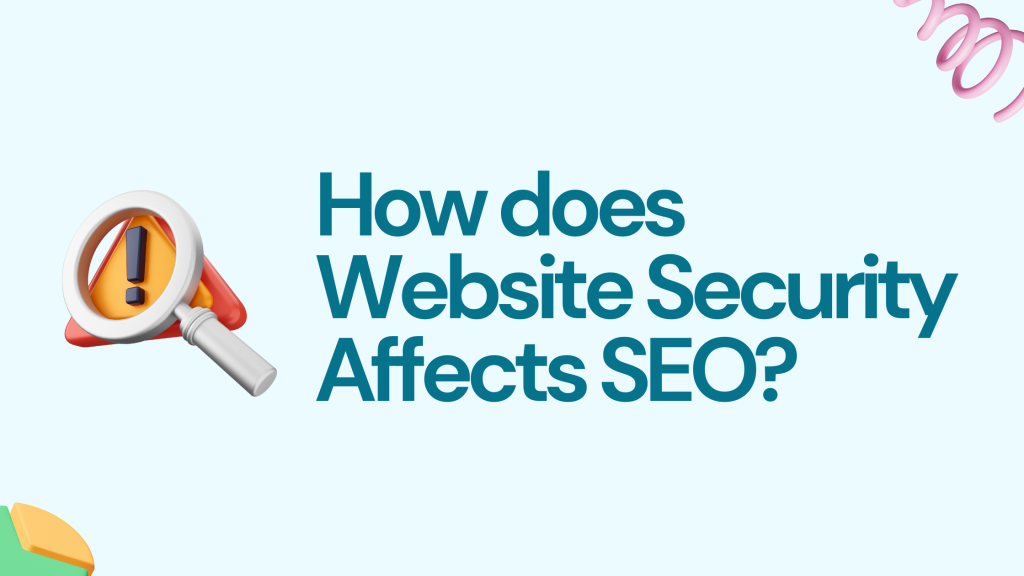There are so many factors that affect and make a strong footprint on the quality of SEO. Technical SEO, Content of the Website and its Quality, URL Structure, Quality of Backlinks – you name it.
But the question here is – Does the Website Security and its quality affect SEO? Let’s just break the suspense – Yes.
In today’s digital landscape, website security isn’t just about protecting your data – it’s a crucial factor in your SEO success. At Cenmax, we’ve seen firsthand how overlooking this vital connection can derail even the most well-crafted SEO strategies.
Let’s dive into the world of website security and SEO, and uncover the hidden links that could be making or breaking your online presence.
The SEO-Security Connection: More Than Meets the Eye
Think of your website as a house. SEO is like the curb appeal that attracts visitors, but security is the foundation that keeps everything standing. Without a solid foundation, even the most beautiful house won’t stay standing for long.
Here’s a startling fact: According to a recent study by Sucuri, SEO spam was detected on 46.76% of all infected websites in 2022. This means that while you’re working hard to optimize your content, hackers could be undoing all your efforts behind the scenes.
But how exactly does website security impact your SEO? Let’s break it down:
1. Google’s Stance: Security as a Ranking Factor
Google has been crystal clear about its stance on website security. Back in 2014, they announced HTTPS as a ranking signal. Fast forward to today, and security has become an even more critical factor in their algorithm.
Here’s what you need to know:
- HTTPS is non-negotiable: Websites without HTTPS are marked as “Not Secure” in Chrome, potentially driving away visitors and negatively impacting your SEO.
- Safe Browsing matters: Google’s Safe Browsing technology helps protect users from malicious sites. If your site is flagged, your rankings could plummet.
- User experience is key: Security issues can lead to poor user experience, a factor that Google considers in its rankings.
We’ve seen websites experience a rankings boost of up to 5% simply by switching to HTTPS. It’s a small change that can make a big difference.
2. The Trust Factor: How Security Builds Credibility
In the world of SEO, trust is currency. A secure website builds trust not just with your visitors, but with search engines too.
Consider this: According to BlueCorona, 84% of users would abandon a purchase if data was sent over an insecure connection, and 82% of people won’t browse an unsecured website at all. This high bounce rate sends a clear signal to search engines that something’s amiss.
Here’s how security builds trust and boosts SEO:
- Lower bounce rates: Secure sites encourage users to stay longer, reducing bounce rates – a positive signal for search engines.
- Increased conversions: Trust leads to more conversions, which can indirectly boost your SEO through increased engagement metrics.
- Better backlinks: Reputable sites are more likely to link to secure websites, improving your backlink profile.
We’ve helped clients increase their organic traffic by up to 30% by implementing robust security measures and showcasing their commitment to user safety.
3. Site Speed: The Hidden Security-SEO Link
You might be wondering, “What does site speed have to do with security?” As it turns out, quite a lot.
Many security measures, when implemented correctly, can actually improve your site speed. And as we all know, site speed is a crucial ranking factor.
Here’s the connection:
- Efficient coding: Security best practices often lead to cleaner, more efficient code – which means faster load times.
- CDN usage: Content Delivery Networks, often used for security purposes, can significantly speed up your site.
- Regular updates: Keeping your site updated for security reasons also ensures it’s running on the latest, most efficient versions of your CMS and plugins.
In our experience, websites that prioritize both security and speed see an average improvement of 15% in their page load times – a significant boost for SEO.
4. Content Integrity: Protecting Your SEO Assets
Your content is your most valuable SEO asset. But what happens when it’s compromised?
Hackers often inject spam content or malicious links into vulnerable websites. This not only harms your reputation but can lead to severe SEO penalties.
Here’s what’s at stake:
- Keyword cannibalization: Injected content can compete with your legitimate pages for rankings.
- Link schemes: Malicious links can make it appear as though you’re engaging in black hat SEO tactics.
- Content duplication: Hackers might duplicate your content across spam sites, diluting your SEO efforts.
We once worked with a client whose rankings dropped by 60% due to a security breach that led to content compromise. After cleaning up the site and implementing robust security measures, we not only recovered their original rankings but saw a 15% increase in organic traffic.
5. Crawlability and Indexing: Keeping the Bots Happy
Search engine bots are the unsung heroes of SEO. They crawl your site, index your pages, and ultimately determine how you rank. But what happens when security issues get in their way?
Security problems can significantly impact how search engines crawl and index your site:
- Blocked resources: Overzealous security measures might accidentally block search engine bots.
- Malware warnings: If Google detects malware, it may limit crawling to protect its systems.
- Server errors: Security breaches can lead to server errors, hindering proper indexing.
By ensuring your security measures are bot-friendly, you can improve your crawl efficiency by up to 30%, leading to better indexing and potentially higher rankings.
Actionable Steps: Securing Your Site for SEO Success
Now that we’ve explored the intricate relationship between website security and SEO, let’s look at some actionable steps you can take to secure your site and boost your rankings:
- Implement HTTPS: If you haven’t already, make the switch to HTTPS. It’s a clear ranking signal and builds user trust.
- Regular security audits: Conduct monthly security scans to catch and address vulnerabilities early.
- Use a Web Application Firewall (WAF): A WAF can protect against common threats like SQL injection and cross-site scripting.
- Keep software updated: Regularly update your CMS, plugins, and themes to patch known vulnerabilities.
- Implement strong password policies: Enforce the use of strong, unique passwords and two-factor authentication.
- Monitor your site: Use tools like Google Search Console to stay alerted to security issues.
- Educate your team: Ensure everyone involved in managing your website understands basic security practices.
Remember, website security is not a one-time task but an ongoing process. By making it a priority, you’re not just protecting your site – you’re laying the foundation for long-term SEO success.
Conclusion: The Security-SEO Synergy
As we’ve seen, website security and SEO are not separate entities but two sides of the same coin. A secure website is more likely to rank well, while good SEO practices often contribute to a more secure site.
By prioritizing both security and SEO, you’re not just improving your rankings – you’re building a robust, trustworthy online presence that will serve your business well in the long run.
At Cenmax, we’ve helped numerous clients navigate the complex interplay between security and SEO. We’ve seen firsthand how a comprehensive approach to both can lead to dramatic improvements in online visibility and performance.
Are you ready to take your website’s security and SEO to the next level? Don’t let hidden vulnerabilities hold back your rankings. Take action today to secure your site and watch your SEO soar.
Ready to secure your SEO success? Contact us for a free website security and SEO audit. Let’s unlock your site’s full potential together!

